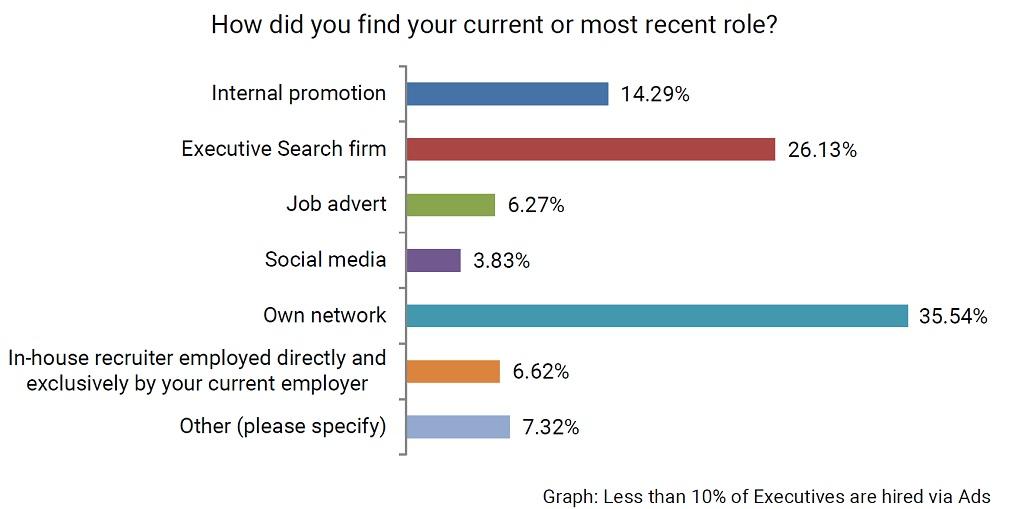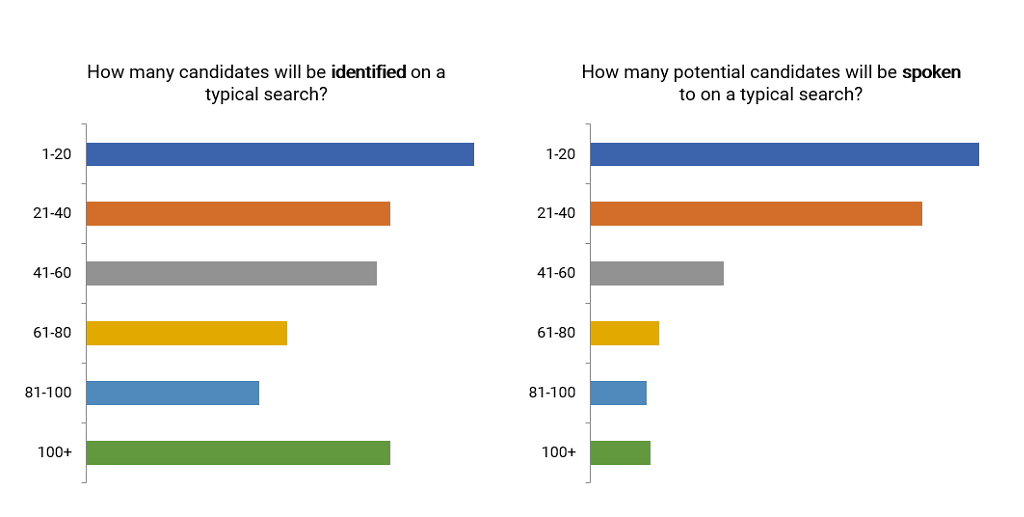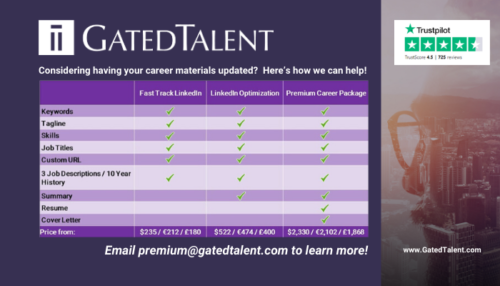When the executive search consultants come calling, many potential candidates believe they are about to be offered a job. In reality, however, the executive search process is a lengthy one, with a timeline spreading 90 days on average, and the fact that you are on a recruiter’s radar does not mean you are going to receive an offer. From the perspective of the consultant, the executive search process timeline looks like this:
- Identify
- Approach
- Assess
- Internal Interview
- Shortlist Presentation
- Client Interviews
- Negotiation
- Completion
What does it look like from the candidate perspective, however?

The executive search process begins with the longlist
When you receive your initial contact from the recruiter, it merely means you’ve been identified. It might that that the recruiter has spoken to a “source” who has recommended you. It might be that you’ve been spotted on Linkedin or GatedTalent; it might be that you’ve been found in a database search. However, at this stage, you are one of potentially 100 candidates (maybe more) who the recruiter may be considering. The fact is that 70% of candidates are what executive search consultants call “passive” – i.e., not actively looking for a new role. Executive search firms get paid to identify and connect with these people directly – you are not alone in being approached!

Do you accept the call?
My advice? Always. You may be happy in your current role, but it doesn’t mean that the recruiter might not have something better up her sleeve. Even if she doesn’t, a conversation with a recruiter now may help make life easier if you do find yourself actively looking in the future. Building relationships with recruiters is never a bad thing to do, even if you are not ready to get into a lengthy executive search process. It doesn’t hurt to talk.
That said – don’t take risks. The call is important, and you should do it at a time that is convenient for you. Not on a train, and not in front of colleagues. If the time is not right, say so – simply state: “I’d be happy to discuss this further. Can I suggest we speak at…” or even “Let me have your contact details, and I will call you back.” The recruiter will respect this.
The initial conversation
The recruiter may not know much about you at the time of the initial contact – but you know less about them! Be sure to understand the basis upon which the consultant has contacted you. If she represents a retained executive search firm, you can reasonably assume that she is working on a specific opportunity for a particular client, and she is operating on an exclusive basis. If she is a contingent recruiter, that may not be the case – it might even be that there is no specific role. Ensure you understand the nature of the call. Ask directly.
That said – just as you have concerns about privacy, it may well be that the recruiter has similar constraints. The recruiter is unlikely to be able to name the specific client, and there is often good reason for this – for example, it might be that there is an executive in the role currently who is not aware of the search for her successor. The executive search process is almost always confidential.
Once you’ve got past the niceties, you can expect the recruiter to start to ask you questions. It’s worth having a copy of your resume in front of you and being in a position to discuss your career, highlighting your achievements and transferrable skills.
Moving forward – Meeting the recruiter
An initial conversation does not tie you into anything. However, you can expect the recruiter to ask if you are interested in progressing the conversation. Feel free to probe a little – ask to see the job specification, for example.
If you are working with a retained search consultant, you can expect to have a formal interview process. This is a topic that I’ve blogged extensively on elsewhere, so I’m not going to spend too much time on it here, however in terms of general preparation:
- The interviewer is likely to probe. You can expect questions to be specific, and so it is well worth thinking through your key accomplishments in advance of the meeting. Be ready to sell yourself.
- Do your due diligence. If you are going to be placed into a senior position, you are going to be expected to hit the ground running. Demonstrating a good understanding of the position that you are being interviewed for, of the situation that the client is in, and the markets that it serves will make the recruiter more confident of putting you forward for a client meeting.
Post-interview follow up
It’s always worth sending a short note after the interview. Thank the recruiter for his or her time and express your interest in progressing discussions. It is perfectly reasonable to send this message by email – handwritten notes are no longer the norm.
Meeting the client
Behind the scenes, the executive search consultant will put together a lengthy shortlist report, talking about the leading candidates and providing a detailed commentary on each. Hopefully, you’ll make the cut and, at this stage, you’ll meet the client.
Client interviews will vary significantly based on the nature of the hiring organization. Senior executives being considered for roles in large organizations can reasonably expect to face eight rounds of interviews – a combination of 1:1 meetings and group sessions. Some of these interviews may be carried out by phone, but you can certainly expect to undertake several face to face meetings as part of this process.
Personality testing for executives?
Yes, it happens. There is data to suggest that boards of directors tend to be unsuccessful in hiring CEOs, partly because they are inclined to hire extroverts with an Ivy League education. Data suggests that better criteria for hiring would be:
- Speedy and confident decision making
- The ability to engage
- The ability to learn and adapt
- Focus on results
Much of this can be measured. As a result, there is an array of firms that are happy to support the hiring organization.
Background testing
There have been a number of recent news stories about senior executives being placed into leadership roles, only for an embarrassing (or worse) story from a previous role leading to the position being short-lived. As a result, executive recruiters will now work with the client – and sometimes, third party specialists to undertake a thorough background checking process. You can expect your resume to be validated, your social media history to be reviewed, and former colleagues and associates to be spoken to before a formal offer is confirmed.
The offer process
Executives tend to receive a significant pay increase when changing roles – to see a 20-40% increase in total annual compensation is not unusual. This will be made up of a host of elements, including basic pay, an equity stake (or options) and some form of bonus scheme to align the interests of the successful candidate with the hiring organization. There are a host of complexities associated with this process, and it’s not unusual for a candidate to hire an expert to support them during this final stage of the executive search process.
And then…
The real work begins! If it’s tough getting to the top, it’s even tougher staying there. Data suggests that 38% of new leaders fail within 18 months, which demonstrates why the hiring organization is so focussed on making the right hire – but also illustrates why the executive needs to do her due diligence before accepting. Kick the tires. Check the numbers – but if you take the plunge, good luck!
How do you get involved in the executive search process in the first place?
It’s worth making the point that – while the executive search process timeline might take 90 days from the perspective of the hiring organization, from the perspective of the executive, it can take considerably longer. You may have to wait for a suitable opportunity to arise, and you may not then be successful. As a result, from the perspective of an executive, it can take a year to be appointed into a new role. However with the GatedTalent job board you can discover exclusive executive appointments on our newly launched job board and get on the radar of prestigious executive search consultants! Unlike traditional methods, where most executive appointments remain hidden from job boards, we’ve revolutionized the process. Say goodbye to uncertain waiting periods and missed opportunities. By joining GatedTalent, you become visible to a network of renowned executive search consultants actively seeking top talent for coveted roles. Our innovative platform ensures that your executive journey remains on the fast track, with unique visibility to recruiters. Empower yourself to swiftly and effortlessly secure your dream executive position. Don’t miss out—take the first step towards your next career move by joining GatedTalent today. Your success story starts here!
Join GatedTalent Now!
Thank you
We have sent a verification link to your email. Please follow the instructions to activate your account.












